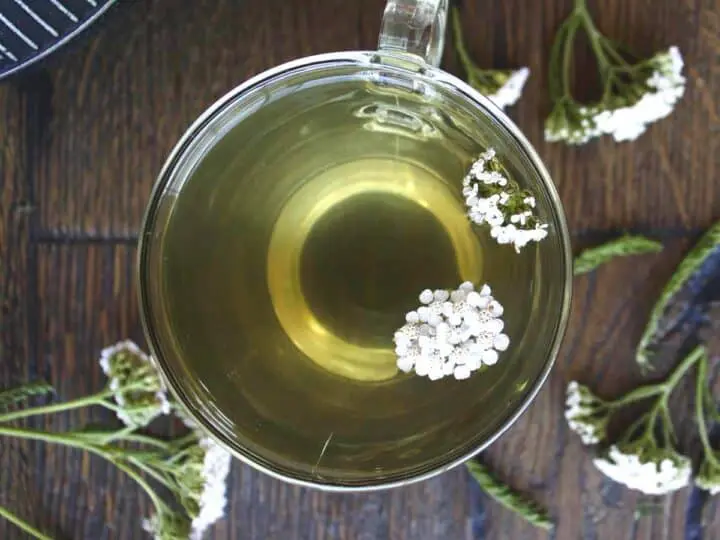Yarrow (Achillea millefolium) is a potent medicinal herb that has been used for centuries to treat a variety of health conditions. Known for its powerful antibacterial, antifungal, and anti-inflammatory properties, yarrow tea is often considered a natural remedy that can help protect the body from harmful pathogens and promote overall health. Here’s why yarrow is so effective and how you can use yarrow tea to boost your immune system and fight infections.
Why Yarrow Is So Powerful
1. Antibacterial Properties
- How It Works: Yarrow contains compounds such as flavonoids, alkaloids, and tannins, which have strong antibacterial effects. These compounds help inhibit the growth of harmful bacteria, making yarrow tea an effective natural remedy for preventing and treating infections.
- How to Use: Drinking yarrow tea can help fight internal bacterial infections, and applying it topically can cleanse wounds and prevent bacterial growth.
2. Antifungal Effects
- How It Works: The antifungal properties of yarrow are primarily due to its high content of volatile oils and other bioactive compounds. These components help inhibit the growth of fungi, making yarrow effective against conditions like athlete’s foot, fungal nail infections, and yeast infections.
- How to Use: Yarrow tea can be used as a foot soak to treat fungal infections, or the cooled tea can be applied directly to the skin to address fungal issues.
3. Anti-Inflammatory Benefits
- How It Works: Yarrow is rich in anti-inflammatory compounds such as azulene and camphor. These compounds help reduce inflammation in the body, which is often a key factor in many chronic diseases. By reducing inflammation, yarrow tea can help alleviate symptoms of conditions like arthritis, digestive disorders, and respiratory infections.
- How to Use: Regular consumption of yarrow tea can help reduce inflammation throughout the body, providing relief from conditions such as arthritis and inflammatory skin conditions like eczema and psoriasis.
How to Make Yarrow Tea
Ingredients:
- 1-2 teaspoons of dried yarrow leaves and flowers
- 1 cup of boiling water
- Honey or lemon (optional, for taste)
Instructions:
- Boil the Water:
- Bring a cup of water to a boil.
- Prepare the Tea:
- Place 1-2 teaspoons of dried yarrow leaves and flowers into a tea infuser or directly into a cup.
- Steep the Tea:
- Pour the boiling water over the yarrow. Allow the tea to steep for 10-15 minutes. The longer it steeps, the stronger the tea will be.
- Strain and Serve:
- If you’ve steeped the loose herb directly in the water, strain the tea to remove the plant material. Add honey or lemon if desired, and enjoy.
Health Benefits of Yarrow Tea
1. Supports Wound Healing
- Yarrow’s antibacterial and anti-inflammatory properties make it an excellent remedy for treating and cleansing wounds. Applying cooled yarrow tea to minor cuts and abrasions can help prevent infection and speed up the healing process.
2. Fights Respiratory Infections
- Yarrow tea can help relieve symptoms of respiratory infections like colds, flu, bronchitis, and pneumonia. Its anti-inflammatory properties reduce inflammation in the respiratory tract, while its antimicrobial effects help fight off the pathogens causing the infection.
3. Promotes Digestive Health
- Yarrow tea is known for its ability to soothe digestive issues, including indigestion, bloating, and cramps. Its anti-inflammatory and antispasmodic properties help relax the digestive tract and reduce discomfort.
4. Regulates Menstrual Cycle
- Yarrow has been traditionally used to regulate the menstrual cycle and reduce menstrual cramps. Drinking yarrow tea can help balance hormones and ease the discomfort associated with menstruation.
5. Improves Skin Health
- The antimicrobial and anti-inflammatory properties of yarrow make it beneficial for treating skin conditions such as acne, eczema, and rashes. Applying yarrow tea topically can help soothe irritated skin and promote healing.
Tips for Best Results
- Consistency: For optimal benefits, incorporate yarrow tea into your daily routine. Regular consumption will help you experience the full range of its healing properties.
- Combine with Other Herbs: Yarrow tea can be combined with other herbs like chamomile or peppermint for additional health benefits.
- Patch Test for Skin Use: If you plan to use yarrow tea topically, do a patch test on a small area of skin first to ensure you don’t have any sensitivities.
Precautions
- Avoid During Pregnancy: Yarrow should not be used during pregnancy as it can stimulate uterine contractions.
- Consult Your Doctor: If you have any underlying health conditions, particularly related to blood clotting or if you are taking medications, consult your healthcare provider before using yarrow tea.
- Limit Long-Term Use: While yarrow tea is generally safe, it’s best to use it in moderation and avoid long-term continuous use without breaks.
Conclusion
Yarrow tea is a powerful natural remedy that offers a wide range of health benefits, from killing bacteria and fungi to reducing inflammation and promoting overall wellness. Known as a “defender” against harmful microorganisms, yarrow is a valuable addition to any natural health regimen. By incorporating yarrow tea into your daily routine, you can harness the strength of this ancient plant to protect and enhance your health.
